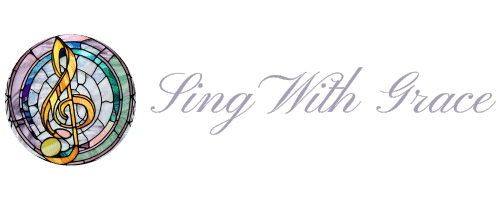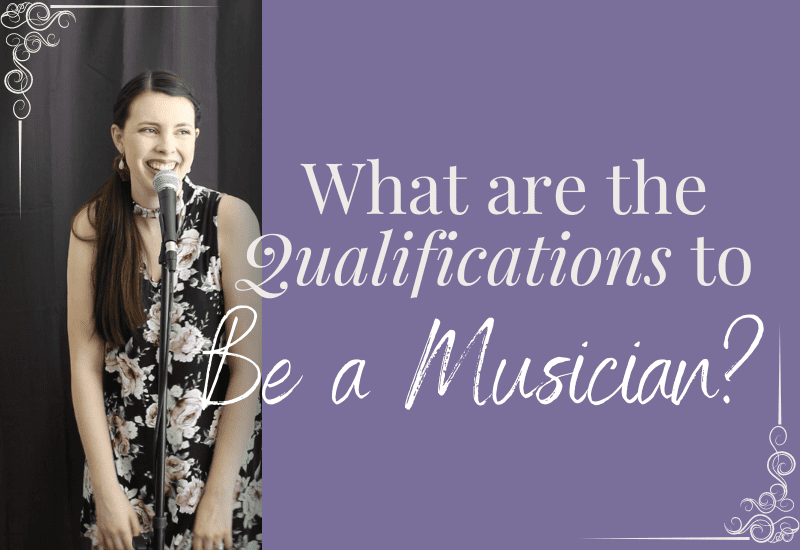Trick question. There are no official qualifications to be a musician. Unlike accountants and lawyers and doctors, you do not need any degrees or government-issued certifications to be a successful musician.
Why then do so many aspiring artists get into mountains of student loan debt in order to become the next Broadway star?
They do it because our society is obsessed with education and qualification–whether or not that diploma framed so nicely on my wall actually means anything. This is my open letter to the world about some realizations I’ve come to recently:
- I do not need a degree from Julliard in order to sing professionally or teach singing professionally (be qualified).
- The only things that musicians need to be successful (in the most general sense of the term i.e. have some fans, be happy with your music, and make some money) are:
- An ability to create some kind of music
- The drive to create that music
- The willingness to share their music
First things first:
You might’ve seen that I’ve recently begun to offer 1:1 on performance coaching sessions. 🎉🎉
I’ve considered pulling the trigger on this for over a year, but for a plenitude of reasons clouding my rational thoughts, I put my dreams on hold.
The most glaring excuse for me not to offer performance coaching was simple: I earned my degree in English and a minor in Performance Studies. Not the conventional BA in music pedagogy or performance.
Because I earned a BA in something other than musical pedagogy, I told myself I could not possibly be qualified and able to help other singers achieve their desired performance goals. I have recently realized that this could not be farther from the truth.
Let’s start by stating the obvious: I do not have the experience necessary to coach Pavorotti. I’ve only been singing classical pieces for a couple years now and I have never been in an opera. There are different levels of expertise in musicianship. I’m not saying that anybody and their grandma can teach vocal lessons effectively.
BUT just because I do not have the experience to teach Pavorotti doesn’t mean that there aren’t plenty of awesome performers out there that I will be able to help tremendously! I mean, seriously.
- I have extensive experience auditioning for and performing in dozens of musicals.
- I’ve taken musical theatre and classical vocal lessons since 6th grade.
- I can read sheet music at an expert level thanks to high school band.
- I’ve performed with the Aggieland Orchestra and A&M Big Band Jazz bands dozens of times.
- I have learned the important anatomical aspects of the voice and learned how to sing multiple styles of music safely.
- I’ve taken loads of acting classes, gave (free) coaching to dozens of performers, and arranged and performed my own cabaret!
- AND I’m still dedicated to learning! I will always take vocal lessons from the best and continue to study texts by Joan Wall and Berton Coffin and tons of other influential and intelligent performers.
I didn’t share all of that to boast. Certainly, God has given me the ability to sing and teach and I am so, so grateful!
On the contrary, I’ve shared this brainstorm of all of my valuable experiences and knowledge to illustrate something scary.
For an entire year I have told myself that none of that experience actually mattered.
I replaced all of the knowledge I have to share with the limiting belief that I couldn’t do anything with it because I don’t have a degree. Not qualified.
This is such a common experience among creatives and STEM-minds alike.
I have dreamed about helping performers for a long time, but I didn’t take action because I did not take a series of over-priced, over-hyped college classes that are for some reason more valuable to society than actual experience singing and performing. College classes (whatever grades you get) = qualified. Do you see how ridiculous this is?
But there is good news! No longer will this limiting excuse hold me down. It’s bologna, honestly. Here’s a fun (and telling!) joke:
What do you call a medical student who got a C on her final exam? Doctor.🩺🥼
To carry this joking metaphor over into my example, I haven’t even gotten Cs on my singing “exams.” I’ve come a long way as a performer and vocalist, and sometimes I like to even think that I am pretty decent. An A student at the very least I’d reckon.

In all seriousness, I am super excited about this opportunity to coach performers’ vocals, stage presence, and performance delivery, so they can reach their personal performance goals. I will continue to improve my own techniques and performance as well as encourage others on their hike to where I am currently.
If you want to follow my coaching journey, follow Sing With Grace on Facebook (@singwithgraceblog) as well as on Instagram (@graceelainebrown)!
The point is, I have finally allowed myself to let go of the qualification excuse! As a performer I am steps and steps ahead of many musicians, and I plan on helping them along on their journey!
Now, I’m not going to pretend that just anybody can be a musician. Let’s talk about the things that musicians do need in order to be successful.
An Instrument
This first thing is pretty obvious. You’re not a musician if you don’t have some kind of instrument. Whether you use your voice or the piano or harmonica or kajon or dj mixing station, you have an instrument🎷.
Without this instrument, you don’t have the ability to make music. Now,
If you give a musician an instrument, he’ll probably need some talent to go with it.
Most successful musicians are good at their instrument (in the case of parody creators, their talent is in being funny, not necessarily their instrument of choice). The basic foundations of musicianship include things like:
- Decent pitch
- Some sense of rhythm
- Ability to emotionally connect with/through music
And are pretty much universally necessary to start out. But that’s really it for the beginnings of musicianship qualification. When I began to learn the alto saxophone in 6th grade, I had a cheap alto saxophone, a teeny bit of each of those above talents, and a background in basics on the piano. But that was all I had.
Have you ever heard a white bellbird’s call? Their mating songs are loud. Like 116.6 dB loud. Now, imagine the song of 16 6th graders blaring on their newly-put-together saxophones on the first day of school.
Just so bad. I apologize to all of my band directors for the horrible, horrible first notes they must endure.
(If you don’t believe me about the bellbirds, here’s this for your viewing pleasure.
There was no skill to be found in the 6th grade building on that first day of school. And yet, our band directors patiently molded our innate talents into notes that could be described as having a somewhat characteristic tone of the saxophone. And then we somehow got good enough to play full songs like Twinkle Twinkle Little Star and Baby by the Biebs.
And just like that, we were musicians. Not traditionally successful, certainly not prodigies, but musicians nonetheless.
The next step to becoming a successful musician again does not have anything to do with having more degrees than a thermometer.
The Drive to Create Music
Whether you’re a beginner sax player or an experienced vocalist, you won’t be making any improvements or growing any following (success) without putting in some work.
It is so easy for a singer to dream about the day that they own the perfect guitar and have written the next Blowin’ in the Wind. That’ll be the day that they’ll magically make money.
It may well be, but without some giggin’ and songwriting flops, that singer is not going to get anywhere. They’ll try hard for a bit and then get burned out. I heard somewhere that 75% of businesses do not withstand the test of time⌚. I’d wager that that percentage is even higher for the rate of aspiring musicians who lose their drive to pursue a musical career.
For example, there’s a small country band in a small Texas town. A couple months after forming, they get their first gig. Yay! After this first gig, they decided to stop advertising and let the gig offers come to them. They actually convinced themselves that they were too good to ask the local bars and venues to hire them. Boo!
Such laziness!
As much as hippies would like us to believe it, most musicians do not become successful by “just letting the music flow, man.” There is a lot of hard work involved in the musical process:
- Getting good at instrument(s)
- Investing in instruments and sound equipment
- Possibly forming a group
- Picking / Writing repertoire
- Recording and posting music
But there’s also so much to be done on the back end:
- Running social media accounts
- Advertising for gigs
- Going to bars / venues and asking for gigs
- Creating / selling merch
- Establishing a recognizable brand
- [MORE!!]
Without the drive to pursue music and the understanding that (for most musicians) it takes more than writing one song to be successful, you just probably won’t become a musician.
Willingness to Share Their Music
This final “qualification” is pretty much a no-brainer. If you spend long nights walking on the moonlit beach and writing groundbreaking music, but you don’t share it with anyone, are you really a musician?
I mean, I guess you technically are considering you’re creating music. Hey, if you want to be a closet-musician, go ahead, I guess. There’s nothing wrong with writing music for yourself or for your sweetheart. BUT I don’t see why you would dedicate your talents to only doing that. I think that, in general, the essence of musicianship is found in the communal aspect of sharing your creation with others.
Musicians want others to feel because of their songs. Music is the only language that is universal. Hoarding your music because you’re scared or prideful will only hurt your chances of becoming a successful musician.
Alrighty. I think I’ve said my piece. In reality, there are no formal qualifications to be a musician, but there are some important considerations to understand if one wants to be a musician that makes money and has a following. (For the record, I plan to do just that!)
I’ve already been blessed with talent from God and taught many vocal and musical skills. I am certainly driven to spread joy and encourage emotional connection through music. And I’m working on being brave enough to share my singing and performances with the world (like I mentioned before, follow me on FB (@singwithgraceblog) and IG (@graceelainebrown) if you want to see!)
Now tell me, are there any excuses you’ve been making to not pick up an instrument lately? Or excuses you have made to avoid anything that you think might bring you or others joy?

